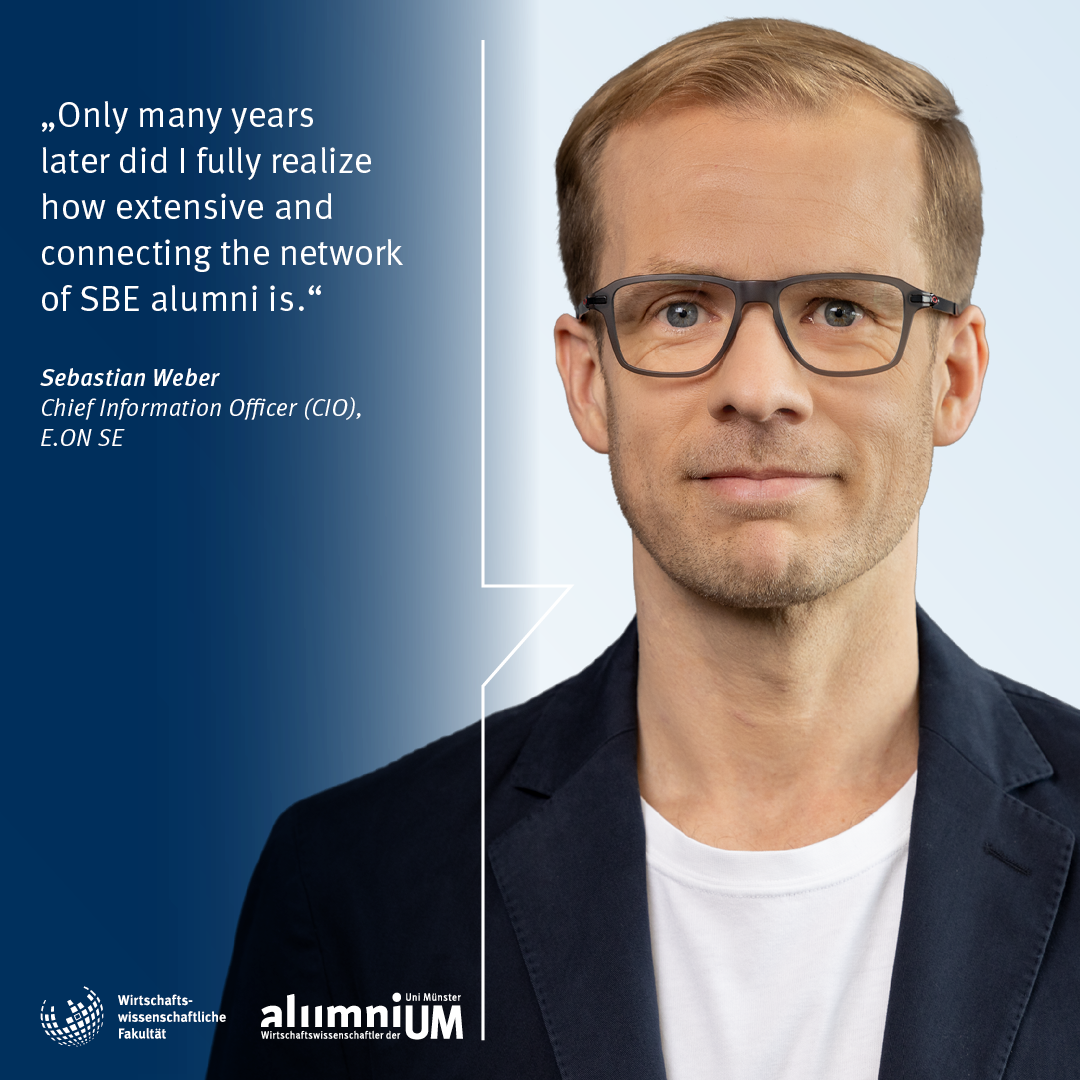Alumni Story: Sebastian Weber

E.ON is one of the largest energy companies in Europe, where Sebastian Weber serves as Chief Information Officer (CIO). Since July 2021, he has been responsible for the company's IT strategy, operations, and governance, leading the development and delivery of digital solutions and services for customers and stakeholders. In the fall of 2024, Sebastian Weber was recognized as CIO of the Year in the "Large Enterprises" category. After completing his studies in Information Systems at the University of Münster, Mr. Weber initially worked as a freelance software engineer. In 2005, he joined Microsoft, where he held various positions both domestically and internationally over the years, advising global enterprises on their digital transformation. In addition to his role as CIO at E.ON, Sebastian Weber is also active in the Forbes Technology Council and the Advisory Council of the Harvard Business Review.
In this interview, Sebastian Weber shares insights into his professional career and reflects on what particularly influenced him during his time in Münster.
Mr. Weber, over the past three years, you have played a key role in modernizing IT at E.ON as Chief Information Officer (CIO). How did you approach this? What was your motivation, and what challenges did you face?
The motivation is clear: the energy transition will not be possible without digitalization. It is crucial to take a long-term perspective and identify which IT core competencies the company needs to build internally. This was certainly one of the biggest challenges, especially after a long period of operating under a traditional outsourcing model. It was also essential to set the right priorities. We decided to fully transition to the cloud first, complete further foundational work, and, in parallel, establish a company-wide data hub. These steps create the best conditions to fully leverage innovations in artificial intelligence and other key areas.
Before joining E.ON in 2019, you spent many years at Microsoft, advising companies worldwide. What did you take away from that time for your career, and were there any experiences that particularly shaped you?
During my last four years at Microsoft, I was exclusively working internationally, spending extended periods in Africa, Southeast Asia, and Eastern Europe. The diversity of talent, cultures, skills, and personal backgrounds of the people I encountered enriched me not only professionally but also personally. One of the most impactful moments for me was experiencing stark contrasts: for example, attending business meetings with industry leaders and politicians discussing artificial intelligence and augmented reality, while looking out the window at people living on the streets without stable housing, often unsure where their next meal would come from. At the same time, I also witnessed firsthand how technology can make a meaningful contribution to society.
When you look back at your time in Münster, what comes to mind, and what advice would you give to today's Business Informatics students?
My time in Münster was shaped by the internet boom and the often-cited dotcom bubble. There was a certain gold rush atmosphere, and everyone felt the urge to act immediately. In this environment, lectures and seminars sometimes struggled to capture full attention. However, there were pioneers at the University of Münster: the first digital lectures and learning materials started to emerge, though they initially felt unfamiliar to everyone. Since then, I have witnessed these waves of innovation repeatedly—most recently with generative AI. My advice is to focus on university studies. Beyond the academic content, you learn many skills that will be valuable in your professional life. Opportunities in the job market will always arise, but wouldn’t it be better to seize them with a solid education?
How do you see the role of artificial intelligence and other technologies in the future—both in your field of work and in the energy industry in general?
As I mentioned at the beginning, the energy transition will not be achievable without digitalization. This also applies to the use of artificial intelligence and other emerging technologies. Many people are not fully aware of how deeply AI is already integrated into our daily lives. At E.ON, we utilize AI in various areas and have been working with quantum computing for years. For instance, we monitor power lines using satellite imagery analyzed by AI, employ drones for inspecting power pylons, and optimize customers' energy consumption. The nature of work itself is also changing dramatically: many tasks are increasingly automated, from text summarization and bid evaluation to analyzing complex business processes. While this can seem overwhelming, ultimately, these are just additional tools that humans must learn to use effectively.


